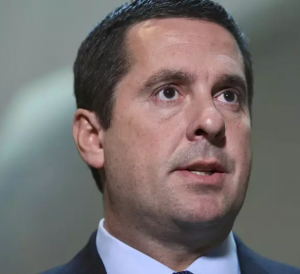Going out – Mark Esper, Mark Tomb, James Anderson, Joseph Kernan, Jennifer Stewart
An overhaul of Pentagon officials began Monday with President Trump's firing of Secretary of Defense Mark Esper. Tuesday, Mark Tomb, the Deputy Chief of Staff to the Undersecretary of Defense for Policy was asked to take retirement. The tide of dismissals also swept out James Anderson, the Pentagon’s Acting Policy Chief; Joseph Kernan, the Undersecretary of Defense for Intelligence; and Esper’s former Chief of Staff Jennifer Stewart.
In the words of The Intercept, the “exodus represents a major shake-up that has been planned for months, with more firings to come across the department.” It added that Ellen Lord, the Undersecretary of Defense for Acquisition and Sustainment, would likely be next. "The president is taking back control of the Department of Defense. It’s a rebirth of foreign policy. This is Trump foreign policy.”
The President promised to bring the troops home from Afghanistan by Christmas no matter what, a promise that does not sit comfortably with some senior military figures, including a few who were dismissed this week.
Claims that Trump is creating instability harmful to American national defense
Democrats in Congress say the dismissals are meant to penalize officials hostile to Trump’s withdrawal plans and will politicize the Pentagon. House Armed Services Chair Adam Smith (D-Wash.) said, "Dismissing politically appointed national security leaders during a transition is a destabilizing move that will only embolden our adversaries and put our country at greater risk." Rep. Seth Moulton (D-Mass.) said he had “no doubt” Esper was fired because he didn’t go along with Trump’s policies.
Confirming Seth’s point, the White House said changes are to achieve foreign policy goals that bureaucrats have stymied through their obsession with endless wars.
The withdrawal of troops may additionally set a political tone where a Biden administration would choose to redeploy troops and establish the Democrat Party as the “forever war” party. Trump, on the other hand, would be the first president in 40 years to avoid launching a new war, and if successful, the first to end the U.S. military involvement in Afghanistan—America's longest war that began in Oct. 2001.
Rand Paul weighs in
Commenting on the changes, Sen. Rand Paul wrote in a tweet, “Reminder to those saying withdrawing troops may cause a clash with Generals/Pentagon: there is only one Commander in Chief, it is Donald Trump, and when he orders the troops out of Afghanistan, the only proper answer is 'Yes sir.'”
The A-Team?
As per his right reserved by the U.S. Constitution, the president replaced Anderson with Brig. Gen. Anthony Tata. Esper was replaced by Chris Miller, the former Senior Director for Counterterrorism and Transnational Threats at the National Security Council. Stewart, Esper’s Chief of Staff, was replaced by Kash Patel, a former National Security Council official who previously served as an aide to Rep. Devin Nunes to help uncover intelligence agency activities during Spygate.
Kernan was replaced by Ezra Cohen-Watnick, who was an aide to Gen. Michael Flynn. He is now Acting Undersecretary for Intelligence Operations in the Pentagon. Col. Douglas MacGregor went to the Pentagon as Senior Advisor to the Secretary of Defense. Meanwhile, at the National Security Agency, longtime Trump loyalist Michael Ellis was selected to serve as the agency’s general counsel. Ellis, who had been serving as Senior Director for Intelligence on the National Security Council, was also a counsel to the House Intelligence Committee under Nunes.
The installation of Tata and Macgregor, in particular, points to a faster troop withdrawal, as both are vocal opponents of the war in Afghanistan.
The current Pentagon plan for Afghanistan is to bring the troop level down to 4,500 this month. National Security Adviser Robert O’Brien says the number should then drop to 2,500 by January before heading to zero in May—in line with the peace plan Washington signed with the Taliban.
How can the new team assist Trump’s goal to completely pull out of Afghanistan by Christmas?
Since the Pentagon’s policy and intelligence chiefs provide leaders with input on troop drawdown matters, those posts are now filled by Tata and Cohen-Watnick, making it easier for the president to push through his agenda. Col. MacGregor, too, has received a lot of praise for his tactics and anti-bureaucratic slight.
As described by news reporter Richard J. Newman (July 28, 1997. Renegades Finish Last. A Colonel's Innovative Ideas Don't Sit Well with the Brass. U.S. News & World Report 123 (4): 35), Macgregor was the "squadron operations officer who essentially directed the Battle of 73 Easting in the 1991 Gulf War."
Under MacGregor's bold leadership, U.S. troops with 10 tanks and 13 Bradley fighting vehicles destroyed almost 70 Iraqi Republican Guard opponents' armored vehicles without any U.S. casualties during a 23-minute span. Moreover, positioned toward the front of the battle and involved in firing, MacGregor didn't "request artillery support or report events to superiors until the battle was virtually over, according to one of his superior officers." An Army NTC official said he was "the best warfighter the Army has got, good at bureaucratic gamesmanship.”
Brig. Gen. Tata won't be able to work in an acting role as have many top Trump officials, but the Pentagon is granting him substantial duties commensurate with a top policy job. Supporters of the President have asked whether this is only about bringing back the troops before Christmas because, with election season in the rear view, the President has more leeway and his actions will not be perceived as hurting re-election chances. Could they be linked to the declassification of Spygate materials?
Digging up some old tweets from Brig. Gen. Tata, it appears that he is no fan of former CIA director John Brennan.

Tata, a previous Fox News guest expert, disavowed those and other inflammatory remarks in a letter to leaders of the Senate Armed Services Committee when he was nominated as Undersecretary of Defense for Policy. He was subsequently installed as Deputy Undersecretary for Policy which does not require confirmation by the Senate. Some members of Congress exclaimed that this circumvented the Senate’s confirmation when he was proving too controversial to confirm. Yet, the Trump administration never actually pulled his nomination and remained firmly behind him even though it had pulled other Pentagon nominees in similar situations.
Another indication of potential revelatory materials being released was, as noted by the Conservative Treehouse, “Lawfare, the liberal media and their related poodles are apoplectic” over the appointments of Ezra Cohen-Watnick and Kash Patel.
 Kash Patel in the movie "The Plot Against The President"
Kash Patel in the movie "The Plot Against The President"
“Patel knows all of the details and nuances within the overall Spygate saga on a very granular level, and his new appointment may be based on an approach toward declassifying documents/evidence in the background of Spygate. Apparently, Patel knows a lot about their shenanigans and games against our president.”
To most, Ezra Cohen-Watnick is an elusive figure, but reporting indicates he is highly competent and follows Trump on policy. From the Atlantic, “I would describe President Trump’s foreign policy vision as absolutely one Ezra completely supports," said a White House colleague who has known Cohen-Watnick for years. "Ezra has consistently provided value, insight, and support at the highest levels of the White House. He’s loyal to the president and he’s made a super impression on everyone that deals with him, me included."
"He’s very engaging, very personable, he tries to connect with people,” said a former intelligence officer on the National Security Council. “But he is able to parse and probe in a way that makes some of his interlocutors very uncomfortable.”
 Rep Devin Nunes (R-CA)
Rep Devin Nunes (R-CA)
“Nunes claimed at one point that his source had been an intelligence official, not White House." Citing four U.S. officials, the Times later reported that his sources on the intelligence reports were Cohen-Watnick and Michael Ellis.
It is suggested that Gina Haspel, the CIA Director, and Christopher Wray, the Director of the FBI may be removed from office next.


